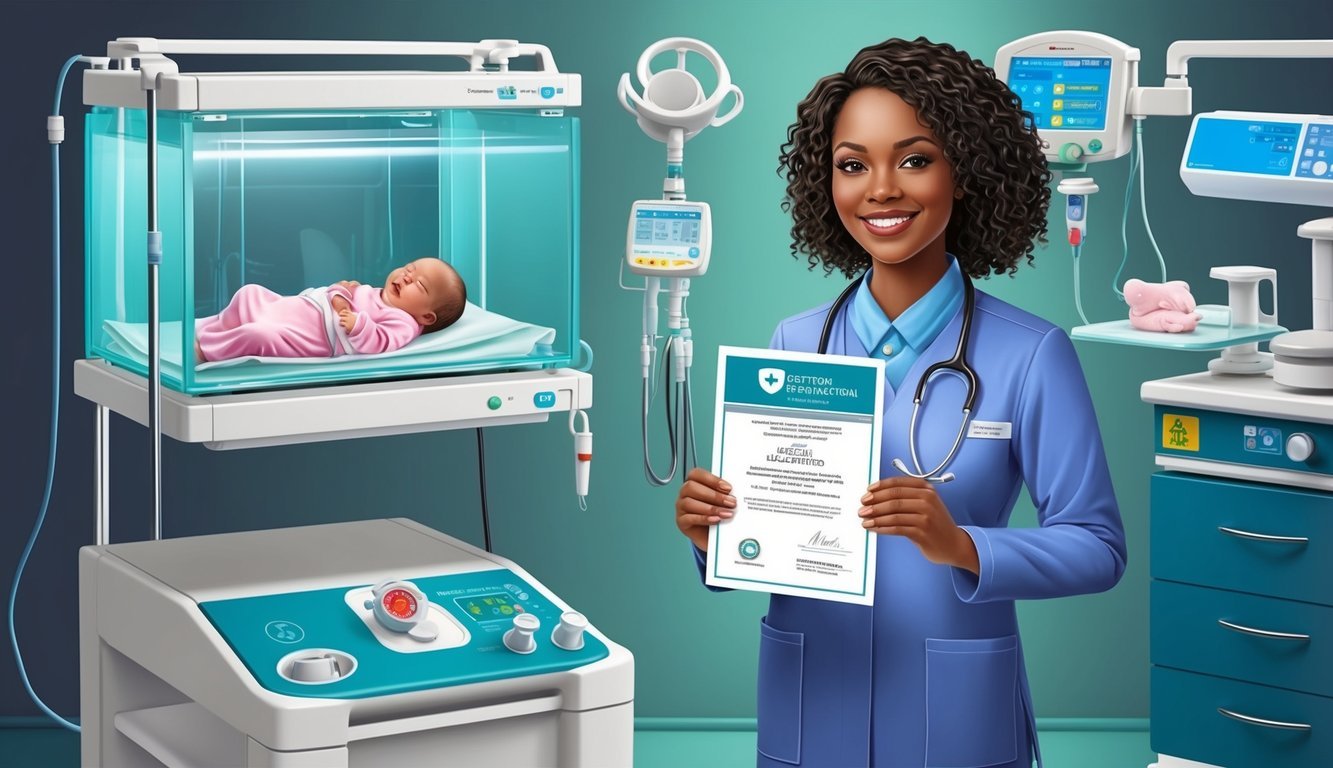As healthcare needs continue to evolve, the role of neonatal nurse practitioners (NNPs) has gained significant importance.
These specialized healthcare professionals provide essential care to newborns, particularly those who are premature or facing health challenges.
If you are considering a career in this impactful field, understanding the various neonatal nurse practitioner programs is crucial for your success.
Numerous institutions across the country offer programs tailored to equip you with the necessary skills and knowledge.
You can choose from online or in-person options, allowing you to find a format that best fits your lifestyle.
Programs such as those offered by Duke University and the University of Pennsylvania provide comprehensive training and clinical experiences that prepare you for real-world challenges.
When embarking on this career path, it’s vital to compare key factors like admission requirements, program length, and tuition costs.
Resources like NursingProcess.org can assist you in making informed decisions by offering insights into the top programs available.
This information will guide you in choosing a path that aligns with your professional goals and personal aspirations.
Overview of Neonatal Nurse Practitioner Programs

Neonatal Nurse Practitioner (NNP) programs prepare you to provide specialized care for critically ill newborns.
You can pursue these programs at different educational levels, influencing your career trajectory and responsibilities in the healthcare field.
Types of NNP Programs
NNP programs typically fall into two main categories: Master’s Degree in Nursing (MSN) and Doctor of Nursing Practice (DNP).
| Program Type | Description |
|---|---|
| MSN | Focuses on advanced nursing skills, clinical training, and often takes two to three years to complete. Graduates are eligible for certification as NNPs. |
| DNP | Emphasizes clinical practice and leadership roles. This program usually takes three to four years and prepares you for higher-level positions in healthcare settings. |
Both options include a combination of didactic coursework and hands-on clinical experience, allowing you to hone your skills in real-world situations.
DNP vs. MSN
Choosing between a DNP and an MSN program depends on your career goals.
The DNP equips you with advanced clinical skills and management techniques, making it suitable for aspiring leaders in healthcare.
In contrast, an MSN provides robust training for clinical practice as an NNP.
Consider the following factors in your decision:
- Duration: MSN programs typically take less time than DNP programs.
- Career Goals: DNP paths may lead to administrative or teaching roles.
- Certification: Both degrees prepare you for NNP certification but carry different implications for your career advancement.
Explore top NNP programs for more information on your options.
Admission Requirements and Application Process

Understanding the admission requirements and application process is crucial for a smooth entry into a neonatal nurse practitioner program.
You will need to ensure that you meet specific prerequisites and prepare various application components.
Prerequisites for Enrollment
To enroll in a neonatal nurse practitioner program, you must first complete certain prerequisites.
These often include holding a Bachelor of Science in Nursing (BSN) from an accredited institution.
You also need to possess an unencumbered Registered Nurse (RN) license.
Many programs require at least one year of RN experience in a neonatal or pediatric setting.
Some schools may also recommend coursework in advanced health assessment and pharmacology.
| Prerequisite | Requirement |
|---|---|
| Nursing Education | BSN from an accredited institution |
| RN License | Unencumbered RN license |
| RN Experience | One year in neonatal or pediatric care |
Application Components
Each application will typically consist of several key components.
A complete application often includes a personal statement describing your career goals and motivations for pursuing a neonatal nurse practitioner role.
You’ll also need to submit official transcripts from all post-secondary institutions attended.
Additionally, you may need letters of recommendation, preferably from healthcare professionals or faculty who can attest to your abilities.
Application deadlines vary between programs.
Make sure to check the specific deadline for each institution you apply to, as they can impact your application timeline significantly.
| Component | Description |
|---|---|
| Personal Statement | Explains your career goals and motivations |
| Official Transcripts | Required from all post-secondary institutions |
| Letters of Recommendation | Preferably from healthcare professionals |
Curriculum and Clinical Experience

A comprehensive curriculum and hands-on clinical experience are essential components of neonatal nurse practitioner (NNP) programs.
These elements ensure that you gain the necessary skills to care for critically ill neonates and their families effectively.
Core Coursework
In the NNP program, core coursework covers foundational nursing principles.
You will study subjects such as Advanced Neonatal Nursing Theory, Pathophysiology, and Pharmacology.
| Course | Description |
|---|---|
| Advanced Neonatal Nursing Theory | Focuses on the principles of neonatal care and advanced practices. |
| Pathophysiology | Examines the physiological processes underlying neonatal diseases. |
| Pharmacology | Covers medications used in neonatal care, including dosages and side effects. |
This core curriculum equips you with the knowledge to assess and manage neonatal health issues.
You will also learn Neonatal Assessment techniques that help in evaluating a newborn’s health status.
Specialized Neonatal Content
Specialized courses delve deeper into clinical scenarios you will face.
You will study Disease Prevention methods crucial for high-risk infants in the Neonatal Intensive Care Unit (NICU).
These courses often include:
- Neonatal nutrition
- Family-centered care
- Emerging neonatal therapies
Through this specialized knowledge, you will be better prepared to provide comprehensive care tailored to individual patient needs.
Emphasis on evidence-based practices ensures you can implement the latest advancements in neonatal care.
Clinical Practice Requirements
Clinical practice is a critical aspect of your training as an NNP.
Programs typically require you to complete clinical hours in various settings, including NICUs and pediatrics.
- Total Clinical Hours Required: Varies by program but often exceeds 600 hours.
- Settings: You will rotate through different environments, obtaining experience in both inpatient and outpatient settings.
This hands-on experience allows you to apply your coursework in real-world scenarios, reinforcing your learning.
You’ll work alongside experienced practitioners, gaining mentorship and insight into daily clinical operations.
Certification and Licensure

To practice as a Neonatal Nurse Practitioner (NNP), you must meet specific certification and licensure requirements.
These include obtaining NNP certification from a recognized body, as well as fulfilling state licensure criteria that vary by location.
NNP Certification Requirements
To become certified as a Neonatal Nurse Practitioner, you must complete a formal nurse practitioner program that focuses on neonatal care.
Following your educational journey, you’ll need to pass the national certification exam administered by the National Certification Corporation (NCC).
The certification you will earn is officially recognized as NNP-BC (Neonatal Nurse Practitioner-Board Certified).
The exam tests your knowledge in various areas, including:
- Clinical management
- Health promotion
- Family-centered care
Eligibility criteria for the exam typically include the following:
| Requirement | Details |
|---|---|
| Degree | Master’s, post-master’s, or doctorate in NNP |
| RN License | Unencumbered registered nurse license |
| Clinical Experience | Completed clinical hours in neonatal care |
Once you pass the exam, you will be certified for a period of five years, after which recertification is needed.
State Licensure
In addition to certification, you must obtain state licensure to practice as an NNP.
The requirements for licensure differ across states, but common elements include:
- Application: Submit a completed application to the state board of nursing.
- Background Check: Undergo a criminal background check.
- Fees: Pay any associated licensing fees.
Some states may require you to complete continuing education credits for licensure renewal.
It’s advisable to check with your state’s nursing board for specific requirements.
Links to your state board can provide more details and ensure your compliance.
Career Outlook and Advancement
As you consider a career as a Neonatal Nurse Practitioner (NNP), understanding the job market and opportunities for growth is essential.
Continuing education and professional development also play a pivotal role in your career trajectory.
Job Market and Opportunities
The job market for Neonatal Nurse Practitioners remains robust, driven by the increasing demand for specialized healthcare in neonatal care.
According to recent projections, employment for NNPs is expected to grow significantly in the coming years, thanks largely to advances in medical technology and a heightened focus on maternal and infant health.
| Factors Influencing Demand | Impact |
|---|---|
| Aging Population | Increased healthcare needs |
| Technological Advancements | More treatment capabilities |
| Focus on Evidence-Based Practice | Enhanced patient care quality |
NNPs can find opportunities in various settings, such as Level III and IV neonatal intensive care units (NICUs), hospitals, and clinics.
Leadership positions often require advanced skills, and pursuing certifications like the Neonatal Nurse Practitioner certification can set you apart in this competitive field.
Continuing Education and Professional Development
To stay competitive, you should prioritize continuing education and professional development.
Many NNPs pursue a Doctor of Nursing Practice (DNP) or additional certifications to enhance their expertise.
These programs often emphasize clinical practice, leadership, and evidence-based practice, equipping you with the skills necessary for advanced roles.
Professional development options include:
- Workshops and Conferences: Ideal for networking and learning about the latest advancements in neonatal care.
- Online Courses: Flexible options to fit your schedule, covering specialized topics in neonatal nursing.
- Mentorship Programs: Connecting with experienced NNPs can provide valuable insights and guidance.
Engaging in these opportunities will not only enhance your skills but also open doors to leadership positions within healthcare settings.
Financial Considerations

When pursuing a Neonatal Nurse Practitioner (NNP) program, understanding the financial obligations is essential.
Here’s what you need to consider:
Tuition Costs
Tuition can vary significantly based on several factors:
| Program Type | Cost Range per Credit |
|---|---|
| Master’s Programs | $500 – $1,000 |
| Doctoral Programs | $700 – $2,000 |
Note that doctoral programs usually require more credits, leading to higher overall costs.
Financial Aid
Many institutions offer financial aid to help offset costs.
Be sure to explore scholarships, grants, and low-interest loans.
Federal financial aid is also available for graduate students.
Accreditation
Enrolling in an accredited program is crucial.
Accreditation can affect your eligibility for financial aid and ensure that your degree is recognized by employers.
Online Programs
Online NNP programs are more flexible and often less expensive.
Consider these options if you wish to balance work and study.
Study Plans
You might choose between part-time and full-time study.
Part-time programs allow you to work alongside your studies, while full-time programs can expedite your education.
This choice can significantly impact your financial situation.
Assess these aspects carefully to make informed decisions about your educational investment.
For more information on financial considerations, visit Nurse.org or NursingProcess.org.

